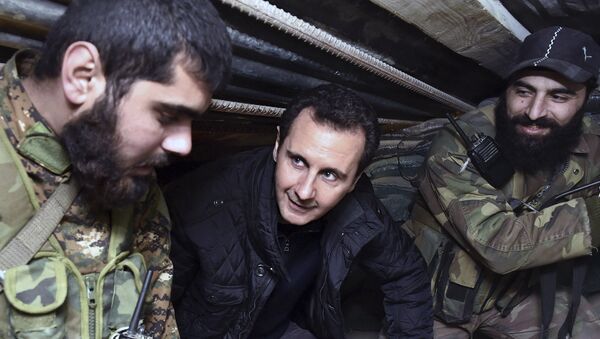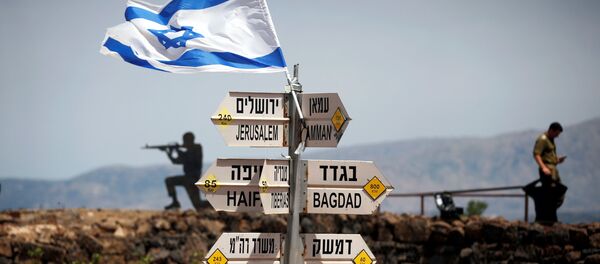On Monday, Israeli media reported that Israel and Russia had reached a deal to deploy Syrian troops in the border area in southern Syria, but not forces of Iran or the Hezbollah movement. On Tuesday, a source told Sputnik that the talks on the de-escalation zone in southern Syria had been underway for a few weeks and no Iranian troops or militias would be allowed to stay in the area.
The media quickly drew a parallel between the unconfirmed reports and the Russian Foreign Minister Sergei Lavrov’s Monday statement, where the minister stressed that only Syrian government troops should have a presence on the country's southern border, which is close to Israel.
"Assad’s main goal is to restore the integrity of Syria and for that purpose, he relied on the help of Iran. If Iran’s involvement hinders this goal, it also contradicts Assad’s interests. If the liberation of the southern Syrian territories on the Israeli border is complicated by the participation of Iranian forces, he may be interested to limit the presence of Iranian troops in the area," Kedmi said.
According to the Israeli defense minister's press service, Lieberman was expected to meet with Russian Defense Minister Sergei Shoigu in Moscow on Thursday.
"These talks are aimed at coordinating actions to ensure that the Syrian army's offensive in the south of the country will not see the participation of any pro-Iranian forces, to ensure that they will not get anywhere near the Israeli border," Kedmi explained.
READ MORE: Iran to Maintain Advisory Role in Syria Despite US' Demands to Withdraw
According to the expert, Lieberman will use this opportunity to highlight that Israel does not accept Iran's presence throughout Syria and in a long run will not be satisfied with withdrawing Iranian forces only from the border areas.
In turn, Mohammad Marandi, a professor at the University of Tehran, told Sputnik on Wednesday that he was surprised by the Israeli demands to keep Iranian forces away from Syria’s border with Israel due to the simple fact that "Iran does not have and never had forces in southern Syria."
"Iran does not participate in all operations across Syria. The Iranians do not have a presence in the south, contrary to what the Israelis keep saying," he said.
According to the Iranian expert, the reports that Israel recently struck Iranian targets and destroyed 80 percent of Iran’s military infrastructure in Syria, were a "pure fabrication."
"There were no Iranian targets and there were no Iranian soldiers. It was a fabrication, probably, because [Israeli Prime Minister Benjamin] Netanyahu wanted [to create] a propaganda show for his own internal purposes because of the allegations of corruption against him," Marandi explained.
He stressed that Iran was present in Syria at the request of the Syrian government and would continue to support the Syrian people "as long as they needed them."
READ MORE: Iran to Stay in Syria as Long as Damascus Wants — Tehran
Over the past years, Assad’s forces have regained vast territories, which had been lost since the outbreak of the Syrian civil war in 2011. The army has recently been preparing for an offensive in southern Syria.
Israeli relations with Iran are strained over Tehran's curtailed nuclear program, which Israel claims still exists, hostile rhetoric and support for the Syrian government and Lebanese Hezbollah movement, which battled Israel during the country’s successive wars with Lebanon. Israeli officials have repeatedly said that Israel would not allow Iran to turn Syria, which has been engulfed in a civil war since 2011, into its military foothold.
The views and opinions expressed by experts do not necessarily reflect those of Sputnik.




